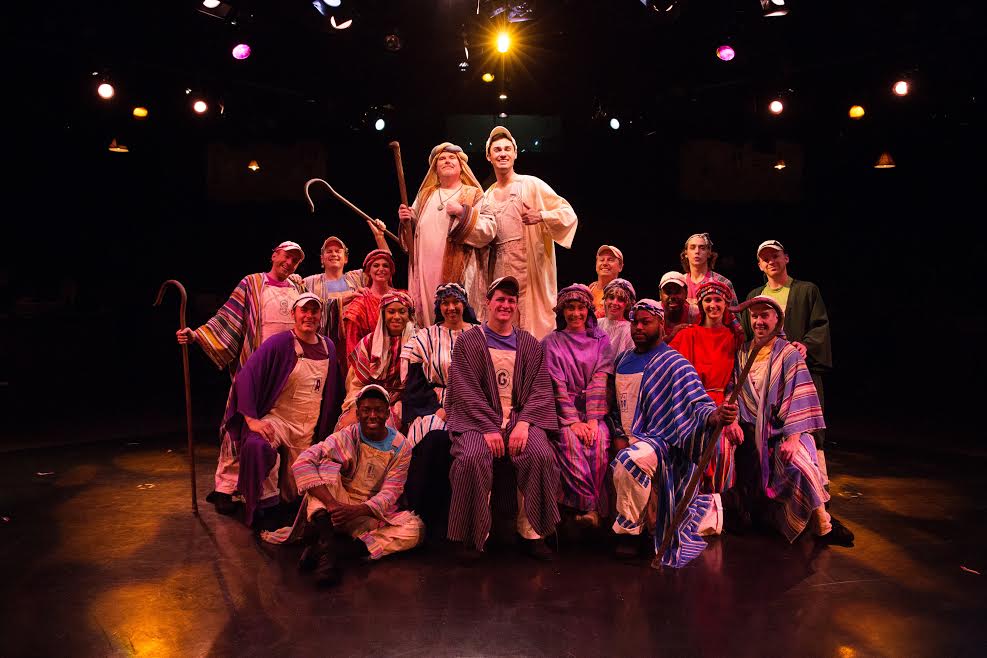Way, way back many decades ago— not long after the city of Columbia began! Toby Orenstein started up a dinner theatre— the finest one in all of Maryland! Toby’s! Dinner and show! That’s the place— this summer— to go! Toby’s! Dinner and show! They’re showing Joseph, just thought you should know! It’s a dazzling production of many colors, this Joseph and The Amazing Technicolor Dreamcoat, Directed by Mark Minnick and Toby Orenstein. This high-octane reimagined summertime fun show will have you bouncing along in your seats with the greatest retelling of Andrew Lloyd Webber’s multi-genre rock show you’ve ever seen or are likely to see! It’s so stellar it’s ahead of its time!
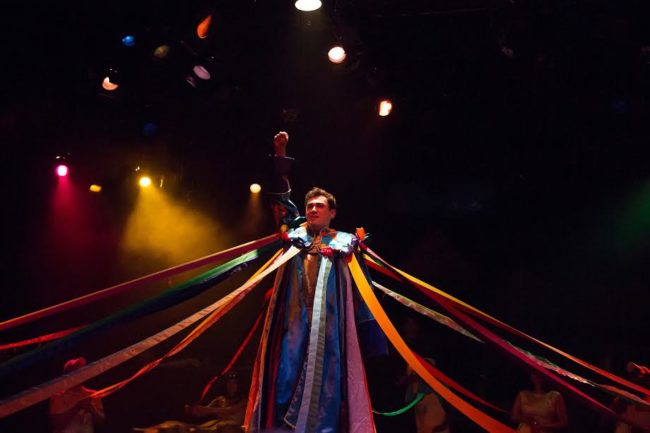
If you think you know Joseph, think again. Toby’s Dinner Theatre is putting a reimagined and yet strikingly and beautifully simplistic version of the story forward onto their stage this summer. Co-Directors Toby Orenstein and Mark Minnick take the production to task and hone in sharply upon the delicate balance of the show’s storytelling element and opportunities for the show to have a ripe and readily accessible humor to it. Minnick and Orenstein do an outstanding job of tempering sincerity with humor all throughout the performance, letting the storytelling element of the show lead the parade of fantastic entertainment from the opening number through to the finale.
Minnick and Orenstein create a transportative world across the narrative that is Joseph taking you on a thrilling journey from start to finish. Resident Scenic and Lighting Designer David A. Hopkins puts all of the working elements into place that allow the audience to fully engage their imaginations when it comes to this adventure. There’s a light-up Sphinx for “Song of the King” and neon glowing steps which cultivates an atmosphere of Elvis Live at The Luxor! Hopkins’ work is stellar for this production, with Egyptian hieroglyphics surrounding the space— that come with a unique history for anyone fortunate enough to have seen the production some decades ago— and a pyramid that blows its top into a disco ball! Hopkins’ versatility when it comes to the transient set pieces seemingly knows no bounds when it comes to Joseph and his lighting design work is as phenomenal as Joseph’s technicolor coat! There’s use of at least 29 different colored lights featured all throughout the production— particularly during “Joseph’s Coat”— and Hopkins’ unique illumination techniques really augments the party atmosphere that Minnick curates during the bigger dance routines.
Go— go— go— dance! The inspiring and uplifting energy which Choreographer Mark Minnick pumps into these dance routines is practically indescribable. In addition to being indefatigable, Minnick’s routines traverse the versatile map that Webber has created by visiting dance styles appropriate to each of the features musical styles. Shifting from “dance club” to “dance club” Minnick’s highly stylized and practically aerobic choreography features swanky smooth moves of jazzy proportions for “Joseph’s Dreams”— complete with shepherd’s crooks as jazz-dancer canes— and quickly evolves into a boot-thumping hoe-down for “One More Angel.” Spirits soar through this number as the dancing ensemble makes the rounds all around the round, so giddy and yet crisply precise in their movements that you almost want to throw back your chair, jump down on the stage and leap on in! “Go, Go, Go Joseph” hits two major dance-club vibes (complete with flawless techno-strobe lighting from Hopkins) and supercharges the cast for the back-half of the production.
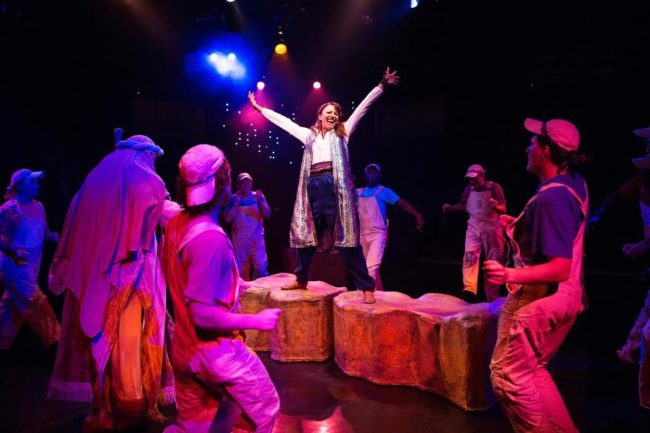
Minnick includes clever nuances in all of dance routines, whether they’re big or small, like the Casino-style strut walk that the women’s ensemble uses during “Potiphar” and the slinky French twirls the girls feature during “Those Canaan Days.” There’s plenty of knee-knocking, pelvis-popping, go-go dancing to go round during “Song of the King” and Minnick hits the fun-nail right on the head with a hilarious hammer when it comes to the jolly good time everyone gets to have during “Benjamin Calypso.” This showcase of enthusiastic, clean-cut, highly energetic choreographic routines showcases not only Minnick’s versatility and deep bench of understanding as a Choreographer, but showcases an intimate and passionate knowledge for the show as well.
There are too many unique and interesting factors laid in place for this production to discuss them all; we’d be here for the duration of the run and it’s much more fun for everyone if you go and see the show, but Minnick and Orenstein should be praised for their framework and subtle shifts that they make to the production on the whole. Pushing the intermission after a prelude-teaser of “Pharaoh’s Story” is an astonishingly bright idea as it reveals a new hope for Joseph rather than just leaving him bouncing full of dance at the end of the first act. Minnick also reworks the finale to appropriately include a nod to everyone without the audience needing the 22-minute recap that is often noted as “The Megamix.” The Directorial Team does a phenomenal job of guiding these performers to the truth and light of the production: the story. So deeply invested in creating this storytelling experience are Minnick and Orenstein, that the audience is readily drawn into the intimacy of the tale, laughing along, empathizing, and enjoying every single moment of the night.
Hands down the most awestriking moment of the production was the perfectly balanced sound system. For years the question among reviewers— at every and any venue— is how would a show sound if the system supporting it was better or different? Sound Designer Corey Brown, working closely with Orenstein, Minnick, and Musical Director Ross Scott Rawlings, have found the answer for Toby’s. Brown has done away with the body mics, giving head mics to soloists and using area drop mics to pick up the ensemble. This genius approach to capturing sound gave crystalline clarity to the sound— both those coming from the performer and those coming from the orchestra pit! Trumpet soloist Tony Neenan (at this performance) could be clearly heard during “Joseph’s Dreams”, muted affectation and jazzy swagger and all! This was true of many instrumental solos throughout the evening, including the notable guitar echoes during “Any Dream Will Do” from Guitarist Christine MacDonald (at this performance.)
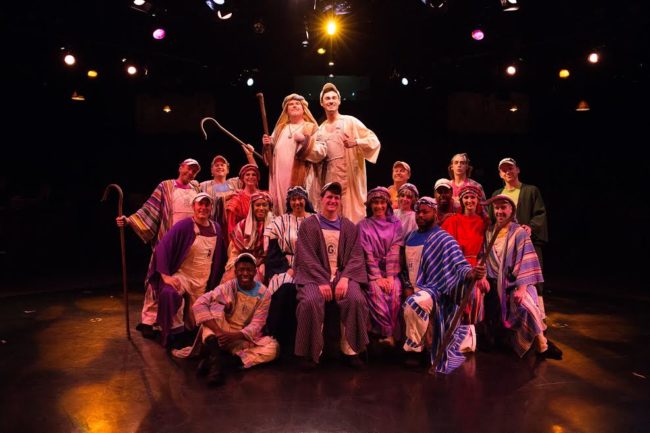
With this new method of sound balancing in play, Musical Director Ross Scott Rawlings draws sharp focus to the musicality of the show, pronouncing the lesser noticed harmonies both from the pit and the ensemble. When the brothers and the female ensemble start celebrating during “One More Angel” and with a different verve take to pleading during “Grovel, Grovel” the intricate and complex layers that Webber has musically penned into the score come glistening through with resplendent radiance.
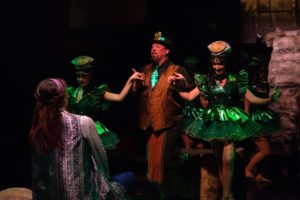
Noteworthy performances among the ensemble include the fierce Mrs. Potiphar (Nia Savoy) who has just a line or two in the song “Potiphar” but uses her dancing body to communicate everything we need to know about the character during that number. Another adjustment to Orenstein and Minnick’s visionary show includes having Potiphar (David Bosley-Reynolds) himself sing the song alongside the narrator, making it a simultaneous first person and third person account of the action. Watching Bosley-Reynolds strut through the song with vocal grandeur and balanced cheeky humor, is a pleasure worthy of the hedonistic flavor of the number. This is rounded out with the decadently ostentatious green-money dresses featured on the female ensemble, as fabricated by Costume Designer Lawrence B. Munsey. Putting his signature flare on a great many pieces, including the technicolor coat itself, Munsey makes the costumes fit the fast-paced tempo of the show and makes the brothers easily identifiable with their monogramed painter’s patchwork overalls.
Jacob (Andrew Horn) has a hearty and robust voice, perfect for the handful of lines that the character is given. His jovial personality, which turns readily to exasperated gloom once things get bad for the family Joseph left behind, is what carries the character to noteworthy perfection. And taking the character’s namesake, Rebecca Vanover of the women’s ensemble, plays the “Angel” during “One More Angel” and mellifluously wails away into the rafters for her solo feature in this number.
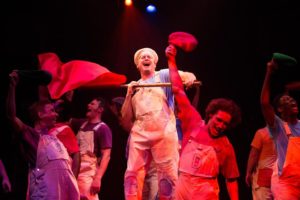
Reuben (Russell Sunday) was the eldest of the children of Israel! Sunday is charismatic, expressive, and a downright hoot in the role of the eldest son of Jacob. Watch his facial features and bodily expressions closely when Joseph gets to singing about his dreams during “Joseph’s Dreams” and again at the end of the number with the crook-freeze poses. But Sunday’s claim to fame in this production is the ludicrous sustain he pushes through his vocals at the end of “Those Canaan Days” (and again during his bow of the finale.) Defying the laws of physics, his vocal push earns him several rounds of thunderous and well-deserved applause. In addition to this vocal trick, his tonal quality is spot-on for the number, which he leads with a flagrant flare of panache. With the deeply solemn convictions in this number, Sunday drives the ensemble into a sobering rendition of seriousness, which makes it that much more hysterical to watch— especially once the flag of revolution comes out and the marching starts. Sliding across the banister as he gets the number underway, there isn’t a single thing not to like about the way Sunday handles Reuben.

With Simeon (David James) and Issachar (Jeffrey Shankle) the next in line…well, actually it’s Simeon and Levi, but we’ll get to him in a minute. James and Shankle, Shankle and James, back in the saddle together again— playing unlinked brothers but buddying up during “Go, Go, Go Joseph” for some clean-cut comedy that really draws the audience into their leg of the story. James and Shankle do make for well-versed brothers, particularly when the pair join up the quartet with Sunday and David Jennings to go two-stepping in double-time all through “One More Angel.” James, who plays the Butler, and Shankle, who plays the Baker, both put their seasoned voices on display for their verses in “Go, Go, Go Joseph” and its delightful. James’ wins the audience over with his physical shtick— knees that are knocking so bad with nerves that Joseph physically has to stop them— and Shankle with his vivacious facial expression when he’s hauled away from the scene.
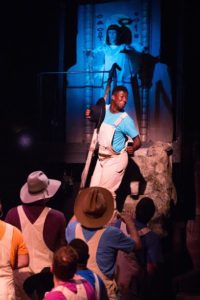
Levi (Gregory Banks) was the true next in line, but is falling into a category all his own. Banks is bursting at the seams with jittery energy and gets the perfect chance to showcase it as he flips, spins, and boot-scoots his way through the number. Banks’ physicality, both willingness and ability, to turn out these impressive acrobatic-style tricks, is the perfect reward for this number. Not only is it a great display of his vocal ability, which is both humorous and yet sincere, but makes him a viable triple-threat contender; Banks can sing, Banks can dance, and Banks can act the heck out of this number, particularly when it comes to presenting his serious and somber face to father Jacob but flipping into full-blown party mode a moment later.

Further down the line are Naphtali (DeCarlo Raspberry) and Benjamin (Joey Ellinghaus) who are both prominently featured in “Benjamin’s Calypso” with Raspberry leading the number and Ellinghaus finding cute little ways to engage himself in the number that is essentially a plea for his freedom. Once hoisted up onto his brothers’ shoulders, or maybe once he’s found his maracas, Ellinghaus is just too cute for words, really living up the notion of innocence that is ascribed to the character. Raspberry is a hot-shot in a straw hat putting a blaze under this tropical island Calypso-inspired number as he shimmies, shakes, and sings his way all around the limbo stick. Raspberry’s charm and scintillating voice is so tempting in this number that he turns Joseph’s battalion of guards (the female ensemble who in that moment are deadlocked in poses of serious resting rage face) into singing and dancing party girls!

Joseph! (Wood Van Meter) He’s Pharaoh’s number two! Van Meter, Egypt looks to you, to see what you will do in this titular role. Holding his own as a newcomer to the Toby’s stage, Van Meter presents a full character arc to Joseph, which is a critical component to the narrative journey that we take along with him. Starting out as green, obnoxious, and frankly irritating to the point where the audience is fully on-board with the brother’s initial plan of fratricide, Van Meter floats along right up until he finds himself imprisoned. “Close Every Door”, which starts as a stirring acapella solo, is a vessel to showcase his vocal strength. “Any Dream Will Do” concludes Van Meter’s journey on a strong note. Watching the way he rages during “Who’s the Thief” is one of his finer moments in the performance.

Move over, Elvis Presley because David Jennings has come to town as The King, playing Pharaoh. (He also plays Asher, but you’ll be too fixated on the insanely impressive portrayal of his Pharaoh that you’ll forget to remember he’s doubled up in this show!) Channeling the essence that is The King of Rock-N-Roll from his early years, Jennings sparks to life straight from inside the light-up sphinx in his posh Elvis getup and he goes to town! Crooning away with that smoldering sound that only Elvis could create, Jennings turnings “Song of the King” into an utter show-stopper. The physicality could be Elvis himself, so perfectly popped are his pelvic gyrations, and the camaraderie he develops with Joseph during “Stone the Crows” is hilarious. Jennings is stealing the show with this cameo role, and you’ll be thanking him very much for making these Vegas dreams come true!

Some folks dream of the wonders they’ll do before their time on this planet is through— and some folks see the wonders that Caroline Bowman has achieved already in her young life. Remarkable and amazing in the role of the Narrator*, Bowman is the conduit through which the show flows. Conducting a current of exemplary electricity both in her earnest approach to telling the story and her sensational voice, Bowman is stunning in the role. Vocally versatile beyond compare, both her range and perfect pitch bring the nuances of this musical directly to the audience. Presenting a sublime balance of not only her physical presence but where in the story her character exists, Bowman creates a narrator that is omnipotent and omnipresent while still discovering these moments as we the audience discover them. In the blink of an eye she transforms from being the echo— almost the shadow— of Potiphar to sympathizing with Joseph. Sliding seamlessly in and out of moments, Bowman narrates the show while simultaneously living and breathing in the moment where she stands. “Pharaoh’s Story” is just one of nearly a dozen examples of her flawless and expressive voice, though perhaps the most impressive to hear as the hope in her gorgeous sound flies right through her mouth and into Joseph’s eyes. Caroline Bowman in the role of the narrator is a must-see this summer season.
You must go, go, go!— see Joseph and the Amazing Technicolor Dreamcoat this summer at Toby’s Dinner Theatre because it is new, because it is reimagined, because there is a boundless well of talent springing up from inside of it. You must go, go, go!— see Minnick’s stellar choreography which captures the epitomizing essence of every musical style featured in the music. You must go, go, go!— see the sensational ensemble, astounding production values, and stunning talent across the featured players, especially among the five women sharing the narrative role. You must go, go, go! GO! GO! GO!
Running Time: Approximately 1 hour and 40 minutes with one intermission
Joseph and The Amazing Technicolor Dreamcoat plays through August 27, 2017 at at Toby’s the Dinner Theatre of Columbia— 5900 Symphony Woods Road in Columbia, MD. For tickets please call (410) 730-8311 or purchase them online.
*As a part of the 50th Anniversary celebration of the city of Columbia and the 45th anniversary of CCTA, the role of the narrator is being shared across five performers! Please check with the box office for a complete schedule.
To read the write-up of Janine Sunday as The Narrator, click here.

